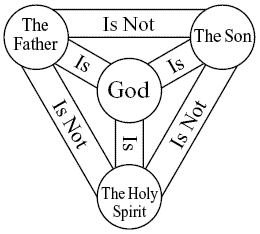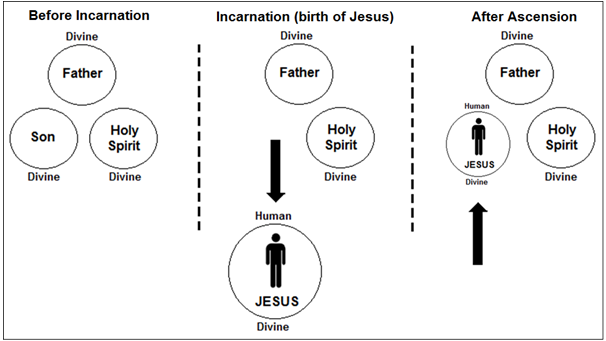



-
 Ten Ways the Bible Disproves the Trinity.
Ten Ways the Bible Disproves the Trinity.
Ten Ways the Bible Disproves the Trinity.
by Many Prophets One Message
on December 1, 2014
 The doctrine of the Trinity defines God as one being who eternally exists as three distinct Persons — the Father, Son and Holy Spirit. Put simply, “one God in three persons”. Each of these persons has their own will, personality and they each perform different roles. While distinct from one another in these regards, in all else they are stated to be co-equal, and “each is God, whole and entire”. This is a typical diagram used by Trinitarians to summarise the doctrine of the Trinity:
The doctrine of the Trinity defines God as one being who eternally exists as three distinct Persons — the Father, Son and Holy Spirit. Put simply, “one God in three persons”. Each of these persons has their own will, personality and they each perform different roles. While distinct from one another in these regards, in all else they are stated to be co-equal, and “each is God, whole and entire”. This is a typical diagram used by Trinitarians to summarise the doctrine of the Trinity:

Now, if the Trinity represents the truth about the nature of God Almighty, and was preached by Jesus (peace be upon him), then one would expect this to be reflected clearly throughout the Bible. Moreover, one would not expect to find anything which negates the doctrine. What follows are ten reasons, taken from the Bible, that disprove the doctrine of the Trinity.
1. God does not change.
A key element of the Trinity is the incarnation. This teaches that the second person of the Trinity, God the Son, took on human flesh in the bodily form of Jesus. Thus when Mary gave birth to Jesus, God entered into the creation as a human being:

However such beliefs contradict what the Bible teaches about God’s nature:
Your throne is established from of old; you are from everlasting. [Psalm 93:2]
Every good and perfect gift is from above, coming down from the Father of the heavenly lights, who does not change like shifting shadows. [James 1:17]
The Bible defines God’s nature as eternal and unchanging; indeed, God cannot change, because He transcends time. So the claim that God became flesh is a contradiction.
Trinitarians try to get around this problem by arguing that when God became man, a human nature was merely added to God’s existing divine nature. Since the two natures did not mix, the divine nature did not change at all and so God remained the same.
Can this be considered valid reasoning? Well, if God ‘added’ a new nature to Himself, then that is a change in state. Was God always a man? He was not. Did God become a man? According to Trinitarians, he did. So to claim that God did not change is nothing more than philosophical wordplay.
To illustrate this, let’s take the example of a man called John. Consider a situation where God grants John a divine nature. Even if John’s original nature, humanity, remains unchanged and separate from his divinity, would you ever conclude that John has not changed at all?
Would any reasonable person argue, “well, John hasn’t really changed in nature, his original finite human nature is only being complemented by an additional infinite nature”. To claim that John, going from mere mortal to master of the universe, has undergone no change would be absurd.
Clearly, John has changed from one state, not being God, to another, being God. This mirrors the Trinitarian claim that God became flesh, which also entails a change from one state, not being human, to another, being human. The end result for Jesus and John is the same; they’ve both become God-men.
We must conclude that the doctrine of the Trinity involves a change in the nature of God. This directly contradicts the Bible’s statements that God is eternal and unchanging.
Thread Information
Users Browsing this Thread
There are currently 1 users browsing this thread. (0 members and 1 guests)
Similar Threads
-
By فداء الرسول in forum English Forum
Replies: 0
Last Post: 05-10-2013, 11:30 PM
-
By فداء الرسول in forum Following Up With New Muslims
Replies: 0
Last Post: 30-09-2013, 12:11 AM
-
By فداء الرسول in forum English Forum
Replies: 0
Last Post: 08-09-2013, 01:21 PM
-
By سعود العتيبي in forum منتديات الحاسب الألى وشبكة الإنترنت
Replies: 0
Last Post: 15-05-2010, 02:00 AM
-
By سعود العتيبي in forum منتديات الحاسب الألى وشبكة الإنترنت
Replies: 0
Last Post: 20-10-2009, 07:06 PM
Tags for this Thread
 Posting Permissions
Posting Permissions
- You may not post new threads
- You may not post replies
- You may not post attachments
- You may not edit your posts
-
Forum Rules

The doctrine of the Trinity defines God as one being who eternally exists as three distinct Persons — the Father, Son and Holy Spirit. Put simply, “one God in three persons”. Each of these persons has their own will, personality and they each perform different roles. While distinct from one another in these regards, in all else they are stated to be co-equal, and “each is God, whole and entire”. This is a typical diagram used by Trinitarians to summarise the doctrine of the Trinity:










 Reply With Quote
Reply With Quote


Bookmarks